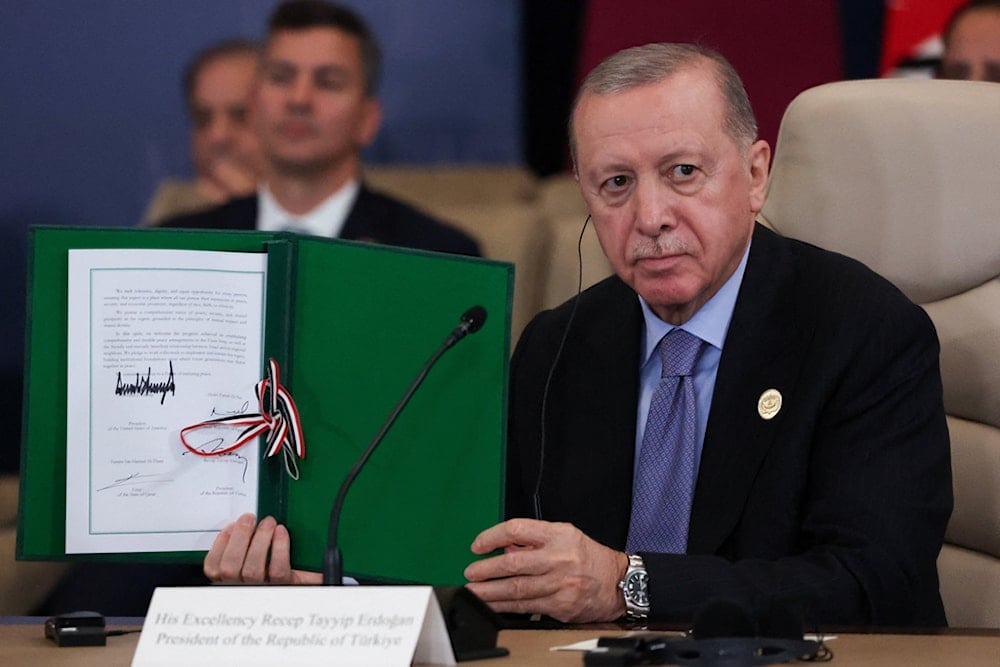Erdogan seeks global backing for Gaza reconstruction after ceasefire
The Turkish president is leading efforts to secure international funding and coordination for Gaza's $70 billion reconstruction following the new ceasefire.
-

Turkey's President Recep Tayyip Erdogan holds a signed document during a summit to support ending the more than two-year war on Gaza after a breakthrough ceasefire deal, Monday, Oct. 13, 2025, in Sharm el-Sheikh, Egypt (Pool via AP)
Turkish President Recep Tayyip Erdoğan has unveiled plans to rally international partners to spearhead Gaza's reconstruction following the new ceasefire agreement that theoretically ended two years of genocide in Gaza.
Speaking to reporters aboard his flight from Sharm El-Sheikh, where world leaders signed the truce on Monday, Erdogan said Turkey would coordinate closely with the Organization of Islamic Cooperation (OIC) and the Arab League to launch rebuilding projects across the devastated enclave. He expressed optimism that large-scale funding from Western and Arab partners would arrive soon.
"I believe the significant financial support will be swiftly provided," the Turkish president said, according to a transcript shared by his office on Tuesday. "We are seeking support from Gulf countries, the US, and European nations. The initial impressions are promising."
The Turkish leader cautioned that "Israel's" history of violating previous ceasefires meant the new deal would need constant oversight by all involved parties.
"Israel has a poor record when it comes to violating ceasefires. This forces us to be more cautious and meticulous," he said. "Turkey, the US, and other countries are determined to preserve this ceasefire. If it turns into genocide again, Israel knows the consequences will be severe."
New diplomatic phase
Brokered with US involvement, the ceasefire saw Hamas release 20 Israeli captives while "Israel" freed thousands of Palestinian detainees, a breakthrough hailed by US President Donald Trump as the formal end to the Gaza genocide.
Erdogan, who has repeatedly condemned "Israel's" actions in Gaza as genocide, said the focus must now shift to recovery and political stability. He praised the recent European recognitions of a Palestinian state as "building blocks" toward a "two-state solution" and proposed sending container homes to Gaza to provide rapid shelter for the displaced before winter sets in.
"Western countries' decisions to recognise the Palestinian state should be seen as building blocks of a two-state solution," he added.
Global donor momentum
Support for Gaza's rebuilding is gathering pace. A UNDP official, Jaco Cilliers, said in Geneva on Tuesday that early indications from donors, including the United States, Gulf nations, and several European states, point to a strong willingness to contribute to the estimated $70 billion reconstruction bill.
"We've had very good indications already," Cilliers said, noting that the war had generated roughly 55 million tons of rubble.
Europe has also begun committing aid. Ireland confirmed plans to allocate millions of euros toward Gaza's reconstruction in the coming months, alongside humanitarian contributions such as 1,500 tents, half sourced from its national reserves. Dublin's total support since 2023 has surpassed €100 million ($115 million), according to broadcaster RTÉ.
Fragile peace, future challenges
The ceasefire's durability remains uncertain, and the presence of multiple actors, Turkey, the US, Gulf countries, and the UN, introduces both opportunities and tensions. Observers say "Israel" may resist what it perceives as an expanded Turkish footprint in Gaza, fearing Ankara could use reconstruction as a vehicle for political influence and soft power.
Tensions have already emerged around the ceasefire's implementation. Israeli Security Minister Israel Katz recently announced plans to demolish underground tunnels as part of "post-conflict demilitarization", a move critics warn could breach the truce and reignite fighting. Hamas has rejected any disarmament, insisting it will not surrender weapons until a sovereign Palestinian state is achieved.
Regional powers are also responding cautiously. Iran's Foreign Ministry spokesperson Esmaeil Baghaei urged vigilance against possible Israeli violations, citing "Israel's" history of breaking past ceasefires and warning that genuine peace requires ending the occupation and blockade of Gaza.
"Those who are concerned about peace must be vigilant so that the regime will not repeat its long-standing habit of breaking promises and committing criminal acts," Baghaei said in Tehran.
Read more: Maduro offers Gaza aid, calls for real justice after Sharm el-Sheikh

 4 Min Read
4 Min Read









